Small lottery vendors across the country are now dreading the expansion of digital lottery tickets – which are sold not just through major private electronic platforms but also on the popular Paotang application. Selling tickets for the government lottery has long been a lifeline for underprivileged, elderly and disabled Thais. However, that source of income is drying up.
“It’s becoming increasingly difficult for us to sell tickets these days,” said Som, a small-time lottery vendor.
A Loei native, Som has roamed Bangkok’s streets selling lottery tickets for nearly two decades now. Her once secure livelihood is now in jeopardy, though, because many customers have switched to buying digital tickets for the 6-digit government lottery.
“I had some 100 unsold tickets on the day the last lottery draw was held,” she said. “I was very anxious and worried. If I had failed to sell them, I would have had to shoulder the loss.”
Growing digital threat
On June 2, the Government Lottery Office (GLO) began selling lottery tickets via Paotang, the app developed by Krungthai Bank and used to support many other government schemes. Public response has been stupendous, with Paotang’s full allocation of tickets being snapped up in a couple of days.
For instance, 9.1 million tickets for the August 16 draw were sold out within three days.
“We were even able to sell tickets that did not have ‘lucky’ numbers,” GLO chairman Lavaron Sangsnit said.
At present, less than 10 percent of lottery tickets issued for the bi-monthly draws are sold via the Paotang app. But the number is set to rise to 20 million tickets or 20 percent by the end of this year. Each of these digital tickets is sold at the published price of 80 baht – significantly cheaper than those sold by street vendors or stalls.
For years, consumers have been paying between 90 and 120 baht per ticket on the street. Overpricing became the norm and the problem persisted despite repeated promises by Prime Minister Prayut Chan-o-cha to tackle it. Prior to the launch of Paotang’s lottery service, major distributors like Kongsalakplus and Market 888 Lotto Online were selling tickets online but at inflated prices.
Hence, the sale of digital lottery tickets at the official price of 80 baht has transformed the scene.
Delighted buyers
Su, a white-collar worker, said she no longer bought lottery tickets from small vendors because it was easier to make purchases online.
“Each lottery ticket cost me 100 baht when I bought them from stalls outside my office,” she said. “Now I feel I’m being treated fairly when Paotang only charges me 80 baht.”
She said she also bought tickets from private online distributors even though their price is 18 baht higher. This is because they offer convenience and a variety of different numbers to choose from.
“When I win the lottery, these sellers transfer the prize money to my account without deducting any tax,” she added.
Panuwat Kawinworapong, managing director of Market 888 Lotto Online, said the Paotang lottery service had not affected his business.
“Our customer base keeps increasing,” he said. “We have a clear positioning. Our customers get extra services, like we don’t charge them anything when they win.”

Why do traditional vendors charge more?
Jirasak Noikam, who chairs the Loei Club of Small Lottery Vendors, said there were some 3,000 vendors in his network, but not all of them receive their lottery tickets directly from GLO. This is why they are unable to sell their tickets at the published price.
“We get the lottery tickets for between 83 and 93 baht each,” Jirasak explained.
GLO normally offers lottery tickets to vendors at 70.4 baht apiece. Of all the tickets issued in each round, some 30 percent or about 30 million go to selected persons or associations based on each provincial governor’s discretion. The remainder go to people who have successfully registered for advance purchase of the tickets.
The overpricing problem, however, occurs when middlemen manage to secure tickets via the quota system. They sell the tickets to small vendors at a higher price, who then sell them to the end user.
“Several government officials play a role in this cycle,” an insider said. “Some associations do not have much money to buy lottery tickets in bulk from GLO themselves. So, they rely on investors and that comes with an additional cost.”
Struggle of small vendors
Networks of small lottery vendors are now joining forces to press the Central Administrative Court to issue an injunction against GLO’s online distribution of tickets. They also want GLO to scrap its plan to make Paotang tickets available at all petrol stations across the country.
“Such actions and decisions are discriminatory. Their move has hurt small vendors, most of whom are disabled, underprivileged and/or elderly,” their representative said.
Jit, a 55-year-old lottery seller in Bangkok’s Klong Sam Wa area, complained that GLO is ignoring the plight of small vendors.
“Just before the last lottery draw, I had to offer a ‘buy 2 get 1 free’ promotion because I was worried about not selling all my tickets in time,” he said.
Kim, a lottery vendor in Chiang Mai, said she was left with 500 unsold tickets from the last draw and has had to be more cautious about how many tickets she buys to sell.
“There are new, significant risks to consider now,” she said.
Jirasak lamented that the government was destroying the livelihood of grassroots people who had long sold lottery tickets for a living.
Big storm brewing
Not only has GLO made tickets available online, it is also planning to offer a new type of lottery. Dubbed No 3, this new lottery will see players select three numbers rather than six.
GLO believes this new 3-digit game of chance will help stop people from spending money on illegal gambling and lotteries, which are untransparent and spark regular controversy. Sometimes, winners fail to receive big prizes promised to them while buyers are not given the chance to select numbers said to have a high chance of winning.
“We want to offer a fair, legal alternative to people,” GLO spokesman Thanawat Polvichai said.
However, the three-digit lotto is still at the planning stage as the new system must be reviewed, he added.
The plan will be proposed to the GLO board next month and then reviewed by the finance minister before being forwarded to the Cabinet. If given the green light, the three-digit lotto will launch early next year.
GLO is currently the largest contributor to state coffers. In the first half of fiscal year 2022, it earned the government 23.54 billion baht. GLO has significantly raised the number of lottery tickets issued each round from 37 million in 2014 to 100 million today.





